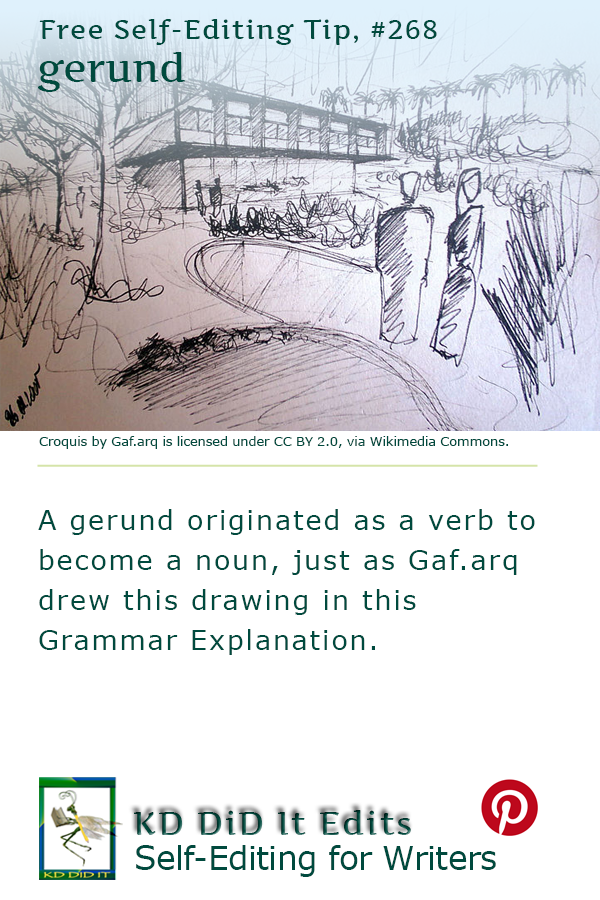Revised as of
9 Feb 2023
That gerund may have started off as a verb, but it’s a noun now. Add an -ing and that draw turns into a drawing. So instead of to do, concentrate on doing well or going at it like gangbusters.
Grammar Explanations is . . .
. . . an evolving list of the structural rules and principles that determines where words are placed in phrases or sentences as well as how the language is spoken. Sometimes I run across an example that helps explain better or another “also known as”. Heck, there’s always a better way to explain it, so if it makes quicker and/or better sense, I would appreciate suggestions and comments from anyone on an area of grammar with which you struggle or on which you can contribute more understanding.
If you found this post on “Gerund” interesting, consider subscribing to KD Did It, if you’d like to track this post for future updates.
Return to top
| Gerund | |||||||||
| Definition: A verb that ends in -ing and functions as a noun while still retaining verbal characteristics. It can take an object and be modified by an adverb.
Other verbals include infinitives and participles (used as an adjective).
|
|||||||||
| Gerund vs Infinitive vs Participle: | |||||||||
|---|---|---|---|---|---|---|---|---|---|
| The main problem is that participles and gerunds look alike, especially in their -ing form. It’s all the fault of those 18th century grammarians who finally settled down to make sense of the English language. You can see how much success they had, lol. Seriously, though they did do a great job with what they had at the time.
Latin was the classic language at the time, and this is where those linguists started. Gerunds and participles were treated differently in Latin, which is why they’re thought of as different now. Today’s grammarians are beginning to refer to them as gerund-participles. It’ll take awhile for this concept to catch on, so it’s important that writers today know what the current differences are. I know . . . it’s a pain. Return to top or post contents |
|||||||||
| The difference is that: | |||||||||
| Verb | What It Does | Examples | |||||||
| Gerund | Functions as a noun
Always has an -ing ending |
Hiking is a favorite sport in Colorado.
Being sick is no fun. Having a heart attack will change your life. After running into Helen, George knew it meant a three-hour lunch. |
|||||||
| Infinitive | Base form of a verb, to ___, that functions as an adjective, adverb, or noun | She had a gift to give me.
She wanted to buy the hat. Jamie likes to hike. |
|||||||
| Participle
Return to top or post contents |
Functions as an adjective
Depending on tense, it may have an -ing or -ed [+] ending |
He had hiked to Pike’s Peak.
Running into Helen meant a three-hour lunch. Jamie’s snoring was enough to keep Marge awake all night. |
|||||||
| Subject of a Sentence or Clause | Rule: Uses -ing | ||||||||
|
Return to top or post contents |
Legend:
Swimming is good exercise. Doctors say that smoking is bad for you. |
||||||||
| After a Preposition | Rule: Uses -ing | ||||||||
|
Return to top or post contents |
Legend:
I look forward to meeting you. They left without saying “goodbye”. |
||||||||
| After Certain Verbs | Rule: Uses -ing | ||||||||
|
Return to top or post contents |
List of Certain Verbs | ||||||||
| avoid dislike enjoy finish |
give up mind / not mind practice |
||||||||
| Examples: | |||||||||
|
Legend:
I dislike getting up early. Would you mind opening the window? |
|||||||||
| Exceptions | Rule: Occurs when a “verb can be followed by the -ing form (gerund) or the to form (infinitive) without a big change in meaning” (Gerunds) | ||||||||
|
Return to top or post contents |
|
||||||||
| Gerund Phrase | Rule: Gerund + modifiers and complements creates a gerund phrase that functions as a noun unit. It frequently combines with other phrases, especially prepositional phrases. | ||||||||
|
Legend:
Cooking for several days ahead of time reduces the work on the day of the party. Helen hated sleeping with her baby sister in the twin bed. Tommy isn’t interested in studying anything. |
|||||||||
C’mon, get it out of your system, bitch, whine, moan . . . which words are your pet peeves? Also, please note that I try to be as accurate as I can, but mistakes happen or I miss something. Email me if you find errors, so I can fix them . . . and we’ll all benefit!
Satisfy your curiosity about other Grammar Explanations by exploring its homepage or more generally explore the index of self-editing posts. You may also want to explore Book Layout & Formatting Ideas, Formatting Tips, Grammar Explanations, Linguistics, Publishing Tips, the Properly Punctuated, Word Confusions, Writing Ideas and Resources, and Working Your Website.
Resources for Gerunds
Some of these links may be affiliate links, and I will earn a small percentage, if you should buy it. It does not affect the price you pay.
“Gerunds in English.” English Club. 26 June. <https://tv-english.club/articles-en/education-en-2/gerunds-in-english/>.
Pinterest Photo Credits:
Croquis – Sample is Gaf.arq‘s own work and is under the CC BY-SA 2.0 license, via Wikimedia Commons.


